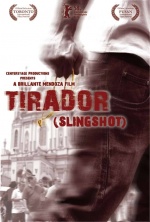
TIRADOR (SLINGSHOT)
Philippines, 2007, 80 minutes, Colour.
Directed by Brillante Mendoza.
Tirador is Tagalog slang for thief. It literally means a slingshot. Director, Brillante Mendoza, says that his very low budget video film, made with the assistance of friends, is ‘guerilla filming’. While it looks as if the director and crew came straight in from the streets and started filming for the long opening sequence, in fact, actors and crew went into this impoverished and squalid area of Manila, made friends with the locals and gained their trust and co-operation. They rehearsed, choreographed and blocked this sequence (a police night raid on some very unsavoury premises) with chaos, noise, fights, as the (mainly) men try to escape. Three cameras were filming in the middle of the action. It is a tour-de-force.
For the rest of this comparatively brief (80 minutes) film, we take up with a variety of characters, glimpsing part of their stories which are mainly to do with thieving. They offer a brief but compelling picture of a cross-section of the inhabitants: a middle-aged man and his gang who are pickpockets (and who gives his mother medication for a sick child); a young man who snatches a purse to pay for his pedicab debt instalments; a womanising young husband who is more interested in drugs; a woman with new dentures who drops and loses them lamenting how she had stolen money to get them; a couple who steal DVD players from shops; a young boy whose father is crushed to death during a Palm Sunday procession; a group of students who bully and rob a timid boy – and one is arrested and beaten but who then puts it over the corrupt cop who has interrogated him.
In many of the socially-minded Tagalog films, there is a preoccupation with sexual behaviour. This is not the case here. The poverty, the needs of the people, the preoccupation with money are the central focus. Again, in many Tagalog films, the Church is conspicuously absent except for devotional pictures. However, here the Palm Sunday liturgy and an afternoon procession are featured. The film was made during Holy Week, 2007.
Political favour forms part of the background, local members bailing out prisoners, handouts to the poor for votes, personal influence in difficult circumstances. The film (made during the last days of the 2007 election campaign) culminates at the mass religious rally of the charismatic El Shaddai movement which proclaims several of the senatorial candidates (ensuring them a million votes, it is said) who are shown in some clips making speeches and promises.
But the film ends with a tirador pickpocketing a wallet at the rally.
1.The impact of the film? Mendoza’s career? Observation of Philippine life?
2.His guerrilla filming, the handheld cameras, video, accessibility to characters, to action? Intensity of filming? From the streets? Yet the preparations, rehearsals, blocking? The blending of actors with local amateurs? The overall impact of this kind of filming? The use of the Palm Sunday liturgy, procession? The El Shaddai rally? The insertion of the actual speeches of political candidates?
3.The title, the slang for petty thief? The characters and their all depending on money, stealing?
4.The opening, the tour-de-force, rehearsed and blocked, choreographed – yet looking spontaneous? The police raid, the squalid building, people trying to escape? The various activities, drugs, money, sex? The attitude of the police? The round-up of the people? Their going to jail? The appeal to the local politician? His bailing people out?
5.Life in the district, the city of Manila, the squalid slums, ordinary houses, the students, schools and cafeterias? The range of poverty and affluence?
6.The ordinary streets, the shops, the homes, people’s ordinary lives, trying to cope?
7.The political background, the elections, the advertising, the local politician and his helping people? Giving out money to voters? The elections, the rallies?
8.The religious background, the Catholic church, the film made during Holy Week? The church, Palm Sunday, the Gospel readings about Jesus going into Jerusalem? The crowds at mass, the devotions, the piety? The procession in the afternoon? The crowds, the man falling, being crushed? Having to get him out from the procession?
9.The El Shaddai rally, the popularity of El Shaddai in fact, the hundreds of thousands, charismatic, the leader, the promotion of particular politicians? Their endorsement – and getting a million votes? The director’s attitude towards El Shaddai and its political behaviour?
10.The range of episodes, characters, the cross-section of the inhabitants? The middle-aged man, his gang and their being pickpockets; the young man who snatches the purse, wanting to pay for his pedi-cab, the instalments, the owners and their pressure on him; the womanising young husband, more interested in drugs; the woman, her new dentures, at home, arguing, cleaning them, dropping them, people trying to help her find them? Her lament that she had robbed someone to get the money to pay for them; the young boy, his father being crushed to death, the funeral? The focus on the group of students who bullied the young man, robbed the timid student? The police chase, the boy who was arrested, beaten – his tricking the policeman? The corrupt policeman? The thieves and the money for themselves? The young couple and the stealing of the DVD machine, their being caught – but the woman still getting away with a machine? The money used for support of families? Or selfishly?
11.The cumulative effect of this kind of experience of the cross-section of Manila, poverty and wealth, politics and religion, morality? And the postscript of a Tirador stealing a wallet at the El Shaddai rally?